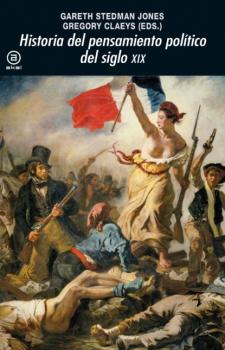ТОП просматриваемых книг сайта:















Gregory Claeys
Список книг автора Gregory ClaeysАннотация
En esta obra de referencia fundamental hallará el lector un análisis exhaustivo del pensamiento político fraguado en Europa, América y Asia a lo largo del siglo que arranca con la Revolución francesa.Elaborado por un brillante equipo de prestigiosos académicos, este extenso volumen aborda, en toda su complejidad, las principales facetas y aristas del pensamiento alumbrado durante el siglo XIX, desde la economía política y el liberalismo a la religión, del radicalismo democrático al nacionalismo, pasando por el socialismo y el feminismo. Incluye asimismo estudios concretos de las figuras más eminentes del periodo –tales como Hegel, J. S. Mill, Bentham o Marx– y escuetas entradas biográficas del resto de pensadores relevantes.Lectura indispensable para estudiantes y profesores, esta magna obra explora las transformaciones sísmicas que –de la mano de las revoluciones políticas, la industrialización y la expansión imperial– experimentó el lenguaje y la imaginación política, sin descuidar por ello otras continuidades menos conocidas del pensamiento político y social.Nómina de autores: Bee Wilson, John Morrow, John Breuilly, Frederick C. Beiser, Donald R. Kelley, Cheryl B. Welch, Gregory Claeys, Christine Lattek, Frederick Rosen, Ross Harrison, Lucy Delap, Jeremy Jennings, James P. Young, Wolfgang J. Mommsen, K. Steven Vincent, Douglas Moggach, Gareth Stedman Jones, John E. Toews, Daniel Pick, Lawrence Goldman, James Thompson, Emma Rothschild, Vernon L. Lidtke, Andrzej Walicki, Christopher Bayly, Duncan Bell y Jose Harris.
Аннотация
This groundbreaking new work explores modern and contemporary political thought since 1750, looking at the thinkers, concepts, debates, issues, and national traditions that have shaped political thought from the Enlightenment to post-modernism and post-structuralism. Encyclopedia of Modern Political Thought is two-volume A to Z reference that provides historical context to the philosophical issues and debates that have shaped attitudes toward democracy, citizenship, rights, property, duties, justice, equality, community, law, power, gender, race, and legitimacy over the last three centuries. It profiles major and minor political thinkers, and the national traditions, both Western and non-Western, which continue to shape and divide political thought. More than 200 scholars from leading international research institutions and organizations have provided signed entries that offer comprehensive coverage of: Thought of regions and countries, including African political thought, American political thought , Australasian political thought (Australian and New Zealand), Chinese political thought, Indian political thought, Islamic political Thought, Japanese political thought, and more Thought regarding contemporary issues such as abortion, affirmative action, animal rights, European integration, feminism, humanitarian intervention, international law, race and racism, and more The ideological spectrum from Marxism to neoconservatism, including anarchism, conservatism, Darwinism and Social Darwinism, Engels, fascism, the Frankfurt School, Lenin and Leninism, socialism, and more Connections of political thought to key areas of politics and other disciplines such as economics, psychology, law, and religion Notable time periods of political thought since 1750 Concepts including class, democratic theory, liberalism, nationalism, natural and human rights, and theories of the state Theorists and political intellectuals, both Western and non-Western including John Adams, Edmund Burke, Mohandas Gandhi, Immanuel Kant, Ayatollah Khomeini, Ernst Friedrich Schumacher, George Washington, and Mary Wollstonecraft



